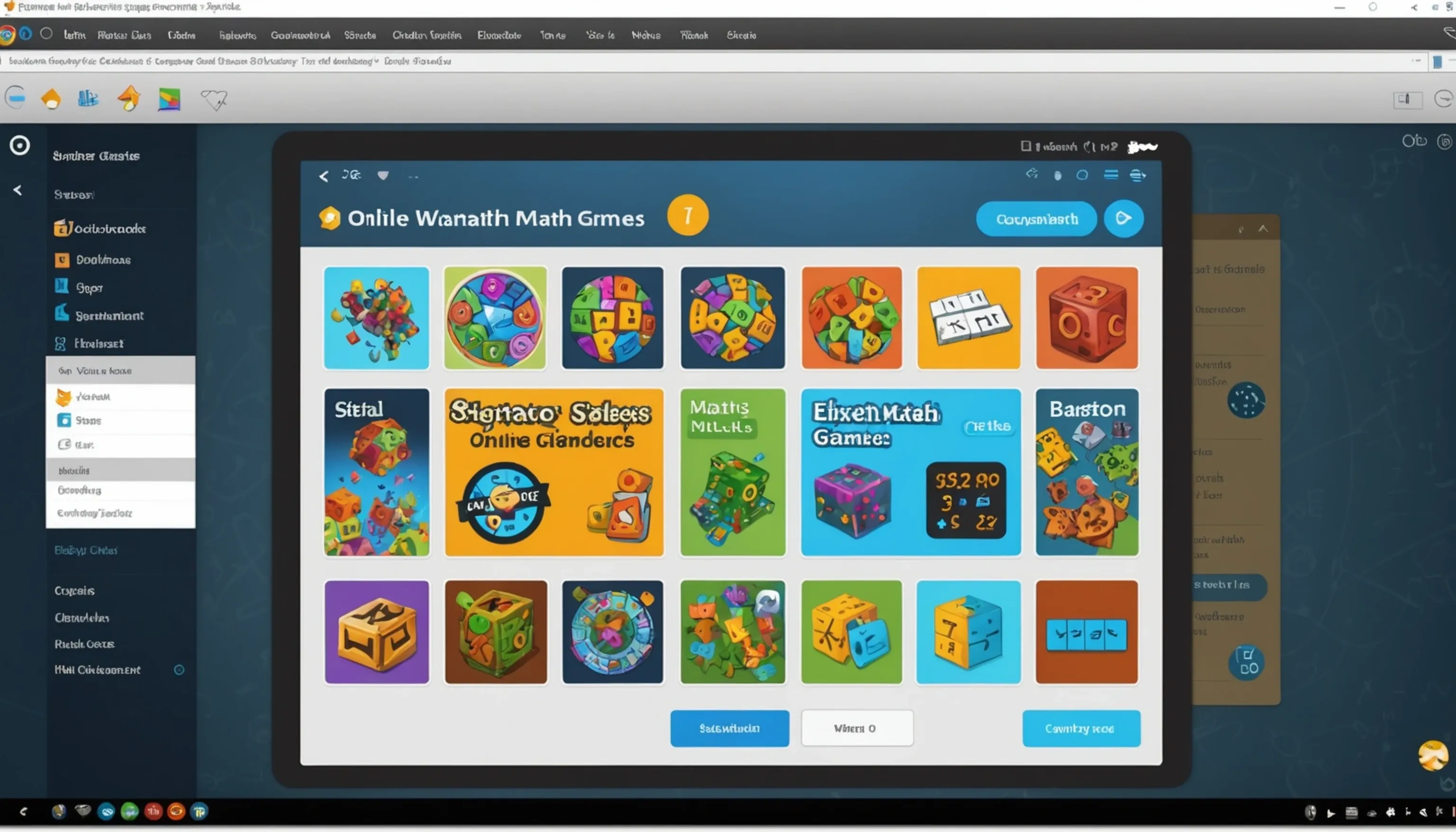Math Games for 7th Grade
 HvWHenry van Wagenberg
HvWHenry van Wagenberg
Engaging Math Games for 7th Graders
Engaging math games for 7th graders are a fantastic way to make learning fun and interactive. These games can enhance students' understanding of mathematical concepts while keeping them motivated. Whether played in the classroom or at home, they offer a break from traditional learning methods.
Some popular options include online platforms and board games that challenge students with real-world math problems. Using games like Math Jeopardy or Escape Room Challenges can foster teamwork and critical thinking skills. Moreover, these games can cater to different learning styles, ensuring every student finds something they enjoy.
Why Math Games Are Beneficial for 7th Graders
Math games are more than just fun; they play a crucial role in the educational development of 7th graders. One of the primary benefits is that they boost engagement. Traditional math lessons can sometimes feel dull and repetitive, but incorporating games into the curriculum makes learning more exciting and interactive. This increased engagement helps students develop a positive attitude toward math.
Moreover, math games promote critical thinking and problem-solving skills. As students face various challenges within these games, they learn to strategize and think critically about the best approach to solve problems. This skill set is invaluable, not just in math but in real-life situations.
Additionally, math games encourage collaboration among peers. Many games require teamwork, which helps students build social skills and learn how to communicate effectively. Working together towards a common goal fosters a sense of community in the classroom.
Another benefit is that math games allow for differentiation. Students have different learning paces and styles, and games can be tailored to accommodate these differences. They can provide both challenge and support, ensuring that all students are engaged and learning at their own level.
Lastly, using games to teach math can help reinforce skills learned in class. The repetition in a fun context aids retention, making it easier for students to recall mathematical concepts during tests and assessments.
Types of Math Games for 7th Grade
There are various types of math games designed specifically for 7th graders, each catering to different skills and learning styles. Understanding these types can help parents and teachers choose the best options for their students.
1. **Board Games**: Traditional board games like Monopoly and Math Bingo can be adapted to include math challenges, making them engaging while reinforcing essential skills. These games encourage strategic thinking and provide a tangible way to practice math concepts.
2. **Online Games**: Websites like Prodigy Math and Math Playground offer a plethora of interactive games that cover various math topics. These platforms often feature gamified learning experiences where students can earn rewards, making practice more enjoyable.
3. **Card Games**: Simple card games can be transformed into math challenges. For example, using a standard deck, students can play games that involve addition, subtraction, or multiplication to win points.
4. **Puzzle Games**: Math puzzles, such as sudoku and logic puzzles, encourage critical thinking and problem-solving. These games help students develop logical reasoning and pattern recognition skills.
5. **Escape Room Challenges**: These are immersive experiences where students solve math-related puzzles to 'escape' from a themed scenario. They promote teamwork and enhance problem-solving skills in a fun setting.
By incorporating a variety of these math game types, educators can create a dynamic learning environment that keeps 7th graders engaged and motivated.

Top Online Math Games for 7th Graders
Here are some of the top online math games that 7th graders will love:
- Prodigy Math: This game offers a fun, interactive experience where students can practice math skills while exploring a fantasy world.
- Kahoot!: A game-based learning platform that allows teachers to create quizzes, making math review competitive and fun.
- Math Playground: This site offers a variety of math puzzles and games that promote critical thinking.
- IXL: This platform provides personalized practice in various math topics, tracking progress along the way.
Kahoot! for Interactive Learning
Kahoot! is a dynamic, game-based learning platform that has gained immense popularity in classrooms, particularly for 7th graders. This interactive tool transforms traditional learning into an engaging experience, fostering enthusiasm for math and other subjects.
One of the standout features of Kahoot! is its ability to create quizzes that can be played in real-time. Teachers can design custom quizzes tailored to the curriculum, allowing students to review key math concepts while enjoying a competitive environment. Students join the game using their devices, answering questions that appear on the main screen. This setup encourages active participation, as students are eager to see how they stack up against their peers.
Moreover, Kahoot! promotes collaboration and discussion. As students work together to answer questions, they learn to communicate effectively and share their thought processes. This collaborative element enhances social skills and fosters a sense of community in the classroom.
Kahoot! also incorporates instant feedback, which is crucial for learning. Students can see how they performed in real-time, allowing them to understand their strengths and areas for improvement. Teachers can analyze the results afterward to identify concepts that may need further reinforcement.
Additionally, Kahoot! offers a variety of game modes, making it versatile for different teaching styles. Whether used for formative assessments or fun review sessions, Kahoot! keeps students engaged and motivated, making math learning an enjoyable adventure.
Prodigy Math for Gamified Practice
Prodigy Math is a captivating online platform that offers 7th graders a unique way to engage with math through gamified learning. This interactive game transforms traditional math practice into an exciting adventure, allowing students to explore a fantasy world while honing their mathematical skills.
In Prodigy Math, students create their own characters and embark on quests that require them to solve math problems to progress. This approach not only makes learning fun but also encourages students to practice essential skills in a low-pressure environment. By integrating math into a story-driven game, Prodigy Math motivates students to keep playing and learning.
One of the key features of Prodigy Math is its adaptive learning technology. The platform adjusts the difficulty of the questions based on each student's performance, ensuring that they are consistently challenged at the appropriate level. This personalized approach helps to build confidence and reinforces learning, as students can advance through the curriculum at their own pace.
Additionally, Prodigy Math provides educators with valuable insights through detailed reports. Teachers can track student progress, identify areas where additional support is needed, and tailor instruction accordingly. This data-driven approach empowers teachers to foster a more effective learning environment.
Overall, Prodigy Math stands out as an effective tool for gamified math practice, combining education and entertainment. By utilizing this platform, students can develop a positive attitude towards math while enhancing their skills in an engaging and enjoyable way.

Math Playground for Fun Puzzles
Math Playground is an innovative online resource that offers a wide array of interactive math games and puzzles designed specifically for 7th graders. It combines learning and fun, making math practice an enjoyable experience for students. The platform features a variety of math topics, including arithmetic, geometry, and problem-solving, catering to different skill levels and learning styles.
One of the standout features of Math Playground is its focus on fun puzzles. These puzzles challenge students to think critically and apply their math knowledge in creative ways. For example, logic puzzles and brain teasers encourage students to approach problems from different angles, fostering a deeper understanding of mathematical concepts.
Additionally, Math Playground includes games that simulate real-world scenarios, allowing students to see the practical applications of math. For instance, games involving budgeting or planning can help students grasp important financial concepts while honing their calculation skills.
The platform also encourages collaboration, as students can work together to solve puzzles and compete in friendly challenges. This collaborative element not only enhances learning but also builds social skills and teamwork.
Teachers and parents can track progress through Math Playground, enabling them to identify areas where students excel or may need additional support. Overall, Math Playground stands out as a valuable tool for 7th graders, providing a wealth of engaging resources that make math enjoyable and accessible.
Hands-On Math Games for the Classroom
Hands-on math games are an excellent way to engage 7th graders in the classroom. These interactive activities allow students to explore mathematical concepts through physical manipulation, making learning more tangible and enjoyable. For example, using manipulatives like blocks or counters can help students understand fractions, decimals, and geometry.
Another popular hands-on game is Math Jeopardy, where students work in teams to answer questions from various math categories. This competitive format encourages collaboration and reinforces learning through repetition.
Additionally, escape room challenges can be adapted for math, requiring students to solve puzzles and problems to 'escape' from a themed scenario. These games promote critical thinking and teamwork, making math practice both fun and educational.
Incorporating hands-on math games into the curriculum fosters a love for learning, enhances problem-solving skills, and makes math accessible to all students.
Math Jeopardy for Competitive Learning
Math Jeopardy is an engaging classroom game that turns math review into a competitive and exciting experience for 7th graders. Based on the popular television quiz show, this game format encourages students to answer questions across various math categories, fostering a deeper understanding of mathematical concepts while promoting teamwork and collaboration.
In a typical Math Jeopardy setup, the classroom is divided into teams. Each team selects a category and a point value, which corresponds to a question of varying difficulty. As students answer questions correctly, they earn points for their team, adding an element of competition that motivates participation.
Math Jeopardy can cover a wide range of topics, including algebra, geometry, and statistics. This versatility allows teachers to tailor the game to meet specific learning objectives and reinforce areas where students may need additional practice.
Additionally, the game encourages quick thinking and reinforces recall skills, as students must respond promptly to earn points. The interactive nature of Math Jeopardy also helps to build a sense of community in the classroom, as students cheer for their teammates and celebrate correct answers together.
Ultimately, Math Jeopardy not only makes learning fun but also enhances students' math skills in a collaborative environment, making it a valuable tool for educators looking to enrich their lessons.
Escape Room Challenges for Problem Solving
Escape Room Challenges are an innovative way to engage 7th graders in problem-solving while making math practice exciting and interactive. These challenges typically involve a themed scenario where students must work together to solve a series of math-related puzzles and riddles to 'escape' the room within a set time limit.
The format encourages collaboration and critical thinking, as students must communicate effectively and share their ideas to find solutions. Each puzzle is designed to reinforce key math concepts, whether it's solving equations, understanding geometry, or applying fractions. This immersive experience not only makes math fun but also helps students see the real-world applications of their skills.
Escape room challenges can be easily adapted for various topics and difficulty levels, allowing teachers to tailor them to their curriculum. For example, a scenario could involve students being secret agents who need to decode a message using math operations, or detectives solving a mystery by calculating clues.
Moreover, these challenges promote time management, as students must complete their tasks efficiently. The urgency of escaping adds an element of excitement that keeps students engaged and motivated to participate.
Overall, Escape Room Challenges are a fantastic tool for fostering teamwork, enhancing problem-solving skills, and making math learning an unforgettable adventure in the classroom.
Math Bingo for Skill Reinforcement
Math Bingo is an entertaining and effective classroom game designed to reinforce math skills for 7th graders. This engaging activity combines the classic game of bingo with essential math concepts, making it a fun way for students to practice their skills while fostering a competitive spirit.
In Math Bingo, each student receives a bingo card filled with answers to various math problems, such as equations, fractions, or geometry questions. The teacher calls out math problems instead of numbers, and students must solve the problems to find the corresponding answers on their cards. This approach not only helps students practice their math skills but also encourages quick thinking and mental math.
The flexibility of Math Bingo allows teachers to customize the game based on the topics being covered in class. For example, if students are learning about ratios, the bingo card can feature different ratio answers. This targeted practice helps reinforce concepts that students are currently studying, making it relevant and effective.
Furthermore, Math Bingo promotes a positive classroom environment. The excitement of competing to get a bingo fosters camaraderie among students as they cheer each other on. Teachers can incorporate small prizes for winners, adding an extra incentive to participate actively.
Overall, Math Bingo serves as an enjoyable method for skill reinforcement, helping students build confidence in their math abilities while enjoying a lively classroom atmosphere.
